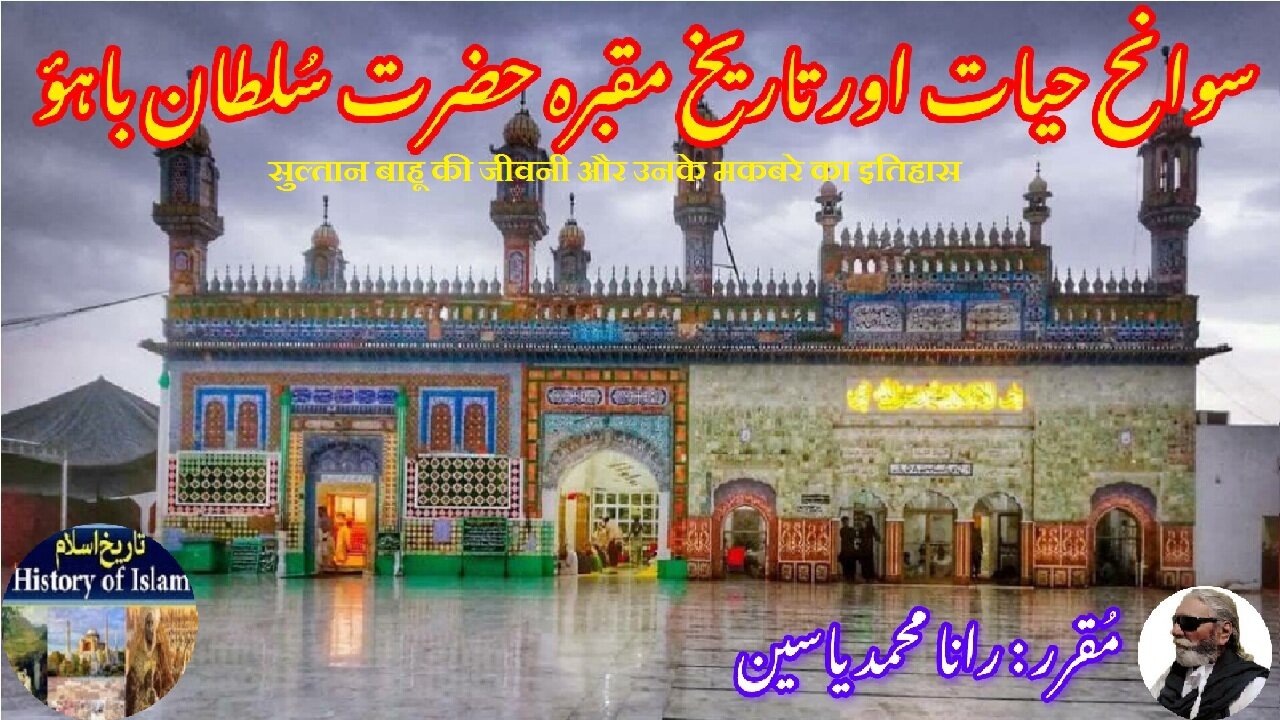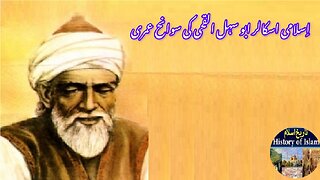Premium Only Content

Hazrat Sultan Bahu and history of his tomb حضرت سلطان باہو کی سوانح حیات اور ان کے مقبرے کی تاریخ
@islamichistory813 #hazrat #sultan #bahu, #sufisaint #cultural #heritage #biography #islamic #mysticism #islamic #philosophy #shrine #historical #figures
Biography of Sultan Bahu and the history of his shrine
Dekhti Aankhooon aur sountay kaanoon ko Asslamoalaikum, sisters, brothers friends and elders, in informative series videos of Islamic ascolars, sufisaints, cultural heritages, islamic philosophys, islamic mysticisms and historical figures. today we are describing biography of Sultan Bahu and the history of his shrine.
Hazrat Sultan Bahu, born on 17 January 1630 in Shorkot, Punjab, was a distinguished 17th-century Muslim Sufi poet, scholar, and mystic. He hailedSultan Bahoo (Allah Bless His Soul) (CA 1628 – 1691) was a Muslim Sufi, who founded the Sarwari Qadiri Sufi order. Sultan Bahoo (Allah Bless His Soul) belonged to Awan Tribe. Awans are the descendants of Ali. Like many other Sufi saints of the Indian subcontinent, Sultan Bahoo (Allah Bless His Soul) was also a prolific writer, with more than forty books on Sufism attributed to him.
However, as the majority of his books deal with specialized subjects related to Islam and Islamic mysticism, it is his Punjabi poetry that has generated popular appeal and made him a household name in the region. His poetic verses are sung in many genres of Sufi music, including Qawaalis and Kaafis. Tradition has established a particular style of singing his couplets, which is not used in any other genre of Sufi music.
The Mausoleum of Sultan Bahoo (Allah Bless His Soul) is located in Garh Maharaja, Punjab, Pakistan. It is a popular and frequently-visited Sufi shrine, and the annual festival is celebrated with the usual fervour, which is now a distinguishing feature of what is being called a ‘shrine culture’ of the Indian subcontinent. from the Awan tribe, which traces its lineage back to Hazrat Ali, the cousin and son-in-law of the Prophet Muhammad (peace be upon him) . His father, Bayazid Muhammad, served as an officer in the Mughal army under Emperor Shah Jahan, while his mother, Mai Rasti, was known for her piety and spiritual insight. It was under her guidance that Sultan Bahu began his spiritual journey, eventually seeking further instruction from Shah Habib Gilani
In 1668, Sultan Bahu traveled to Delhi to study under Syed Abdul Rehman Jilani Dehlvi, a prominent Sufi saint of the Qadiriyya order. Upon completing his training, he returned to Punjab, where he dedicated the remainder of his life to spiritual teaching and writing. He founded the Sarwari Qadiri Sufi order, an offshoot of the Qadiriyya tradition, emphasizing direct experience of the Divine and the importance of inner purification.
Sultan Bahu was a prolific writer, with more than forty books on Sufism attributed to him, primarily written in Persian. Notable works include "Abyat e Bahu," "Risala e Ruhi," "Nur ul Huda," and "Dewaan e Bahu" . His Punjabi poetry, rich in mystical themes, gained widespread popularity and continues to be recited in various Sufi musical genres, such as qawwali and kafi. His verses are known for their profound spiritual depth and have established a unique style of singing his couplets
Sultan Bahu passed away on 1 March 1691 in Jhang, Punjab. His shrine, known as Darbar Sultan Bahu, is located in Garh Maharaja, Jhang district. Originally built on his gravesite, the shrine had to be relocated twice due to the changing course of the Chenab River. Remarkably, during each relocation, his body was found to be intact, a testament to his sanctity . The current shrine is a significant spiritual center, attracting devotees from across Pakistan and beyond.
The shrine is managed by the Auqaf Department and is protected under The Punjab Special Premises (Preservation) Ordinance, 1985 . The annual Urs festival, commemorating Sultan Bahu's death, is celebrated with great fervor on the first Thursday of Jumada al-Thani. Additionally, from the 1st to the 10th of Muharram, an Urs is held to honor the martyrs of Karbala, a tradition initiated by Sultan Bahu himself. These events draw thousands of pilgrims who come to pay their respects and seek spiritual blessings.
Sultan Bahu's legacy endures through his writings, poetry, and the continued practices of the Sarwari Qadiri order. His teachings emphasize the importance of divine love, self-purification, and the remembrance of God. His life and works remain a source of inspiration for spiritual seekers, reflecting a profound commitment to the inner dimensions of Islam.
With this, we seek your permission until tomorrow, tomorrow we will describe the biography of Baha al-Din Muhammad-i Walad and the history of his Shrine.
Allah Hafiz
==============================
-
 6:58
6:58
ISLAMIC HISTORY
4 hours agoBiography of Islamic Scholar Abu Sahl al-Quhi اسلامی اسکالر ابو سہل القحی کی سوانح عمری۔
8 -
 1:04:57
1:04:57
The Quartering
4 hours agoTrump Tricks Democrats Again, Cheerleader Monster, Abortion Clinics Shutdown & More
66.1K17 -
 7:59
7:59
Dr. Nick Zyrowski
1 year agoHow Much Vitamin D Should I Take
2622 -
 1:23:00
1:23:00
Brandon Gentile
1 day agoJames Lavish: The Red Flag Event Sends Us To $1M Bitcoin & $20K Gold
38 -
 1:23:46
1:23:46
Sean Unpaved
4 hours agoOctober Blitz: Wild Card Game 3s, CFB Coaching Chaos, & TNF Fireworks
27.1K4 -
 1:01:36
1:01:36
Dear America
3 hours agoEpisode 2 Graham Allen Show
57.7K52 -
 1:59:01
1:59:01
The Charlie Kirk Show
4 hours agoCancel Netflix? + The Secret Service Disaster + Turning Point Everywhere | Tatum, Cocca, Gaffrey
111K49 -
 LIVE
LIVE
ahdedazs
2 hours ago $0.97 earnedBlack Ops 7 EARLY ACCESS BETA! First Stream on RUMBLE!
92 watching -
 LIVE
LIVE
ZENNY
3 hours agoBO7 IS HERE BOT POV MF HAHAHAHA 6v6 PG18+ | UNFILTERED CHAT | CURSES AND BAD
47 watching -
 LIVE
LIVE
qixso
4 hours ago $1.36 earnedBO7 IS HERE TAP IN !! | @qixso
67 watching
